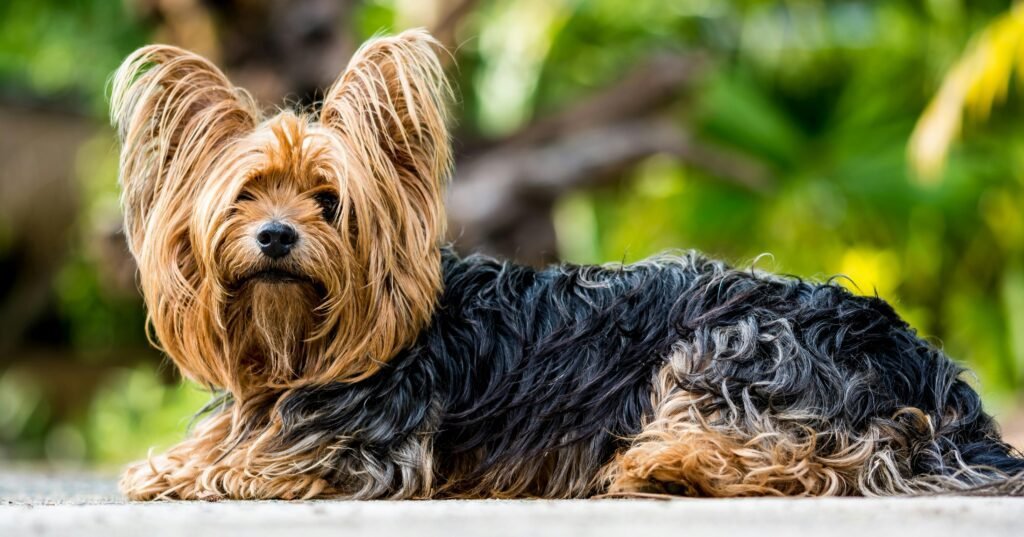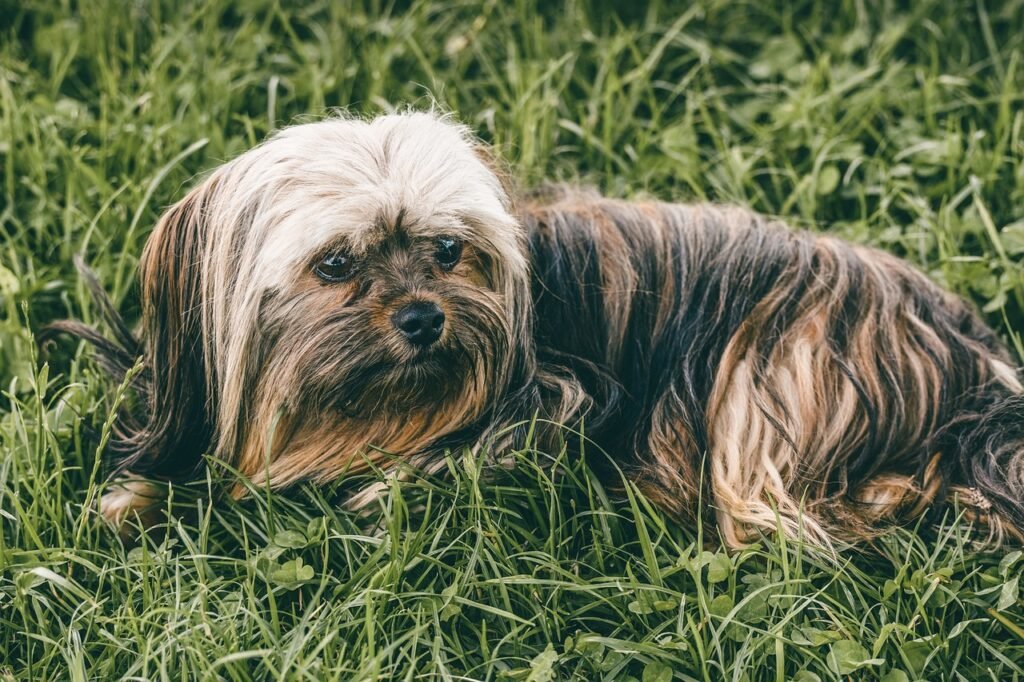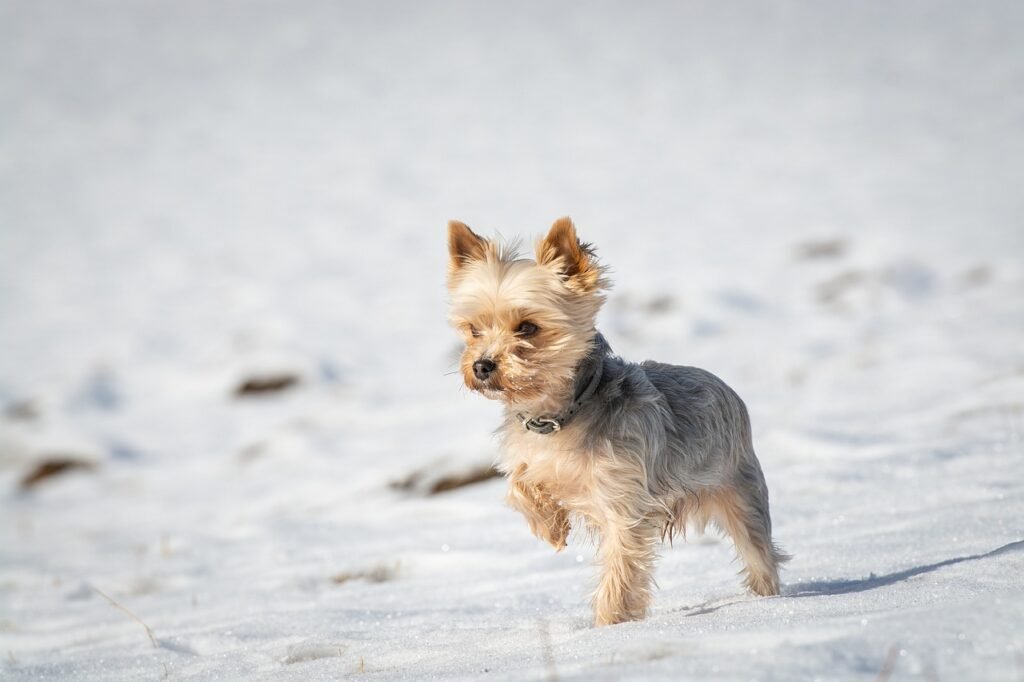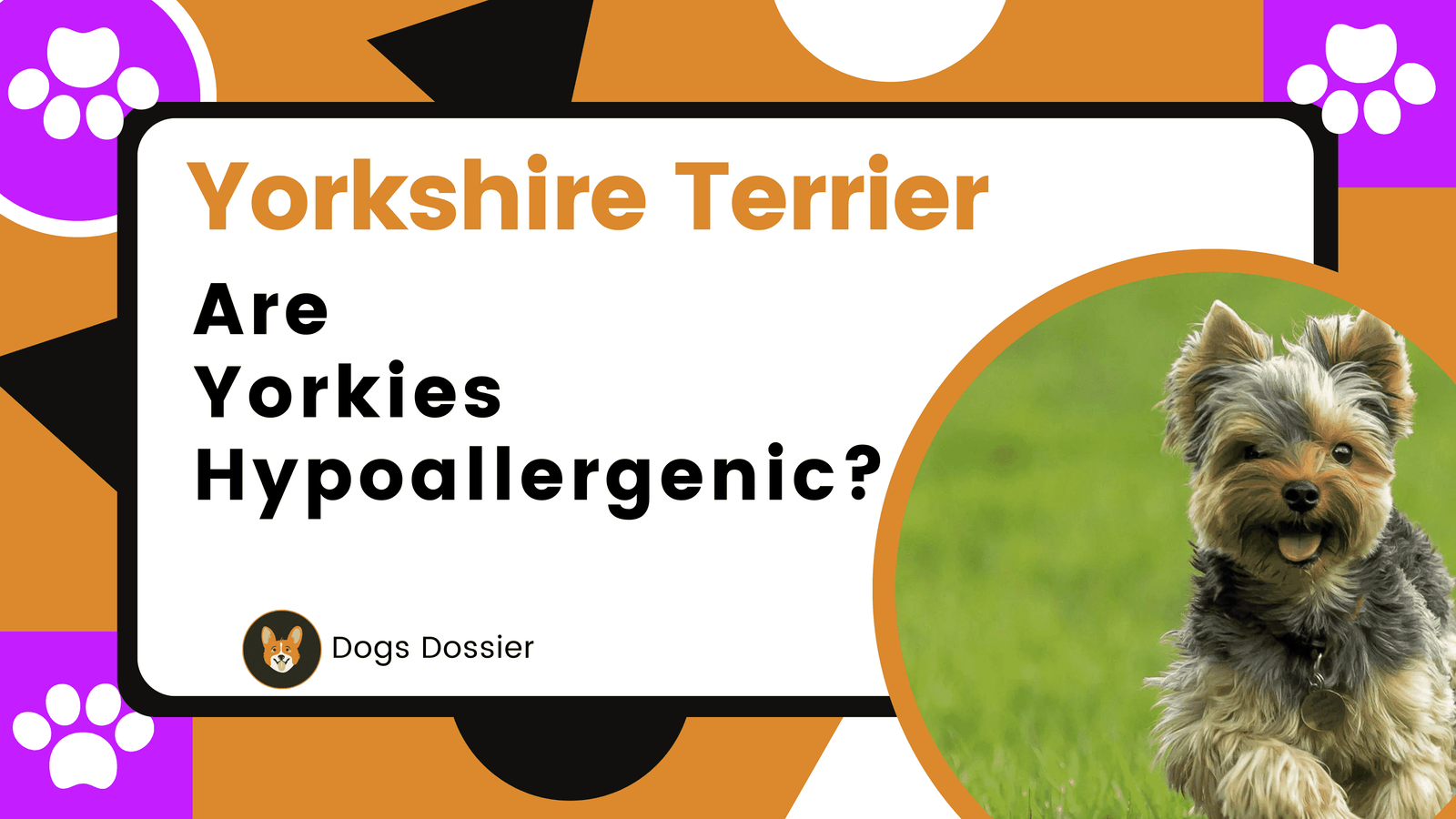Are Yorkies Hypoallergenic? Understanding Allergies and Yorkshire Terriers
Why are hypoallergenic dogs so popular? For many people, allergies are a major concern when it comes to owning pets. Sneezing, itchy eyes, and constant sniffles can make it difficult to enjoy the companionship of a furry friend.
That’s where hypoallergenic dogs come into play. These breeds are often touted as being more suitable for allergy sufferers. Among these breeds, the Yorkshire Terrier, or Yorkie, frequently comes up in conversations. But is a Yorkie a hypoallergenic dog? Let’s dive into this topic and find out.
Understanding Hypoallergenic Dogs
First, let’s clarify what “hypoallergenic” actually means. A hypoallergenic dog breed is less likely to cause an allergic reaction in people.
However, it’s important to note that no dog breed is completely hypoallergenic. Allergies are typically triggered by proteins found in a dog’s saliva, urine, and dander (dead skin cells), not just their hair.
There are many misconceptions about hypoallergenic dogs. Some people believe that these breeds do not shed at all, but in reality, all dogs shed to some extent. The difference lies in the amount and frequency of shedding, as well as how the dog’s coat handles dander.

The Yorkie Breed
Yorkshire Terriers, or Yorkies, are small dogs with a big personality. Originating from England, they were initially bred for catching rats in clothing mills. Over time, they became beloved companion animals known for their distinctive long, silky coats.
Physically, Yorkies are small and compact, usually weighing between 4 to 7 pounds. They have a feisty and energetic temperament, often described as being brave and confident. Despite their small size, Yorkies are known for their boldness and make excellent watchdogs.
Yorkies and Allergies
Allergies to dogs are often caused by proteins found in a dog’s saliva, urine, and dander, not just their fur. When considering Yorkies, many people believe they might be a suitable choice for allergy sufferers due to their unique hair type.
Yorkies have hair that grows continuously, similar to human hair, which means they shed less than many other breeds.
However, it’s important to understand that no dog is completely hypoallergenic, and Yorkies still produce the proteins that can cause allergic reactions. Proper management and regular grooming can help minimize exposure to these allergens.
Is a Yorkie a Hypoallergenic Dog?
Yes, a Yorkie is considered a hypoallergenic dog. This is because they have hair that grows continuously like human hair and sheds minimally, resulting in less dander being released into the environment.
While no dog is completely hypoallergenic, Yorkies are often a better choice for people with allergies due to their low shedding and reduced allergen production. However, individual reactions can vary, so spending time with a Yorkie before adopting is recommended.
Why Some People Believe Yorkies Are Hypoallergenic?
Many people consider Yorkies hypoallergenic because of their hair rather than fur. Unlike breeds with fur that shed frequently, Yorkies have hair that grows continuously and sheds minimally.
This leads to less dander being released into the environment, which is a common trigger for allergies.
Additionally, their small size means they produce less saliva and urine compared to larger dogs, which can also reduce the overall presence of allergens. While these factors can make Yorkies more manageable for some allergy sufferers, they are not a guaranteed solution for everyone.

The Role of Dog Hair and Dander in Allergies
Dog hair and dander play significant roles in triggering allergic reactions. Dander, which is composed of tiny, even microscopic, flecks of skin shed by dogs, can become airborne and easily inhaled by humans, leading to allergic symptoms.
Dog hair itself is not an allergen, but it can carry dander, saliva, and other allergens, spreading them around the home.
Regular grooming and cleaning can help reduce the amount of hair and dander present, but it’s important to remember that even breeds with minimal shedding, like Yorkies, can still produce allergens that may affect sensitive individuals.
Comparison with Other Breeds
When comparing Yorkies to other breeds considered hypoallergenic, it’s important to look at their grooming needs, shedding patterns, and overall allergen production. Breeds like Poodles, Bichon Frises, and Maltese are also known for producing fewer allergens due to their hair type and minimal shedding.
However, each breed has its own unique characteristics and care requirements. For example, while Poodles also have hair and require regular grooming, they tend to be larger than Yorkies, which might influence the amount of allergens they produce.
Ultimately, choosing the right breed depends on individual allergy sensitivities and lifestyle preferences.
Yorkie Hair and Grooming
Yorkie hair is one of the defining features that set them apart from many other breeds. Unlike typical dog fur, which has a distinct growth cycle and sheds regularly, Yorkies have hair that grows continuously and sheds minimally.
This characteristic makes their grooming needs quite unique and essential. Regular grooming not only keeps their coat looking its best but also plays a crucial role in managing allergens in the home.
By understanding the specific grooming requirements of Yorkies, owners can help minimize the presence of dander and other allergens.
Hair vs. Fur: What Makes Yorkies Different
Yorkies are often noted for their hair, which is more similar to human hair than typical dog fur. Unlike fur, which has a short growth cycle and sheds frequently, Yorkie hair grows continuously and requires regular trimming.
This ongoing growth means Yorkies shed less overall, resulting in fewer allergens being released into the environment. This difference in hair type is a key reason why Yorkies are often recommended for people with allergies, though it’s important to remember they are not completely hypoallergenic.
Grooming Needs of Yorkies
The grooming needs of Yorkies are extensive and crucial for maintaining their distinctive coat. Regular brushing is essential to prevent tangles and mats, which can be painful for the dog and difficult to remove.
Yorkies also require periodic baths to keep their hair clean and silky. Haircuts every few weeks are necessary to manage the length and style of their coat. Proper grooming not only keeps Yorkies looking their best but also helps reduce the amount of dander and allergens in the home, making it easier for allergy sufferers to live with them.
How Grooming Affects Allergens?
Regular grooming plays a significant role in controlling allergens for Yorkie owners. Frequent brushing helps to remove loose hair and dander before they can accumulate and become airborne. Bathing a Yorkie regularly washes away saliva and dander from their coat, further reducing potential allergens.
Additionally, trimming the hair keeps it manageable and less likely to trap allergens. By maintaining a consistent grooming routine, owners can significantly decrease the amount of allergens present in their home, making it more comfortable for those with sensitivities.

Scientific Perspective on Yorkies Being Hypoallergenic
The idea that Yorkies are hypoallergenic is a common belief among dog lovers, but what does science say about it? While there is no breed that is entirely hypoallergenic, Yorkies are often considered a better choice for allergy sufferers due to their unique hair type and minimal shedding.
Scientific studies and expert opinions provide insights into why some people with allergies might tolerate Yorkies better than other breeds. However, individual reactions to allergens can vary significantly, so it’s essential to consider personal experiences alongside scientific findings.
Studies and Research Findings
Scientific research on hypoallergenic dog breeds, including Yorkies, reveals mixed results. Some studies indicate that certain breeds, like Yorkies, produce fewer allergens compared to others.
Research has shown that dogs with hair, which grows continuously, tend to shed less dander than those with fur.
However, the amount of allergens produced by a dog can vary widely, even within the same breed. Studies also suggest that factors such as grooming habits, home environment, and individual sensitivities play significant roles in determining allergic reactions.
Expert Opinions
Experts in the field of allergy and immunology generally agree that no dog breed is completely hypoallergenic. However, they often acknowledge that breeds like Yorkies, which have hair instead of fur and shed minimally, can be a better option for some allergy sufferers.
Veterinarians and allergists emphasize the importance of regular grooming and cleaning to manage allergens effectively. They also recommend spending time with a Yorkie before committing to ownership to see if one’s allergies can be managed.
Expert opinions highlight that while Yorkies may be more suitable for some, they are not a one-size-fits-all solution for allergies.
Managing Allergies with a Yorkie
Living with a Yorkie can be a delightful experience, even for those with allergies. By taking specific steps to manage allergens, you can minimize allergic reactions and enjoy the companionship of your furry friend.
Effective management involves a combination of proper grooming, home environment adjustments, and, if necessary, medical treatments. With careful planning and regular maintenance, many allergy sufferers can live comfortably with a Yorkie.
Tips for Allergy Sufferers Who Want a Yorkie
For allergy sufferers considering a Yorkie, there are several strategies to reduce allergens. Regular grooming is essential; brushing your Yorkie daily can help remove loose hair and dander. Bathing your Yorkie weekly can also wash away allergens.
Using hypoallergenic dog shampoos can further minimize the risk of reactions. Additionally, keeping your Yorkie out of the bedroom and off the furniture can reduce the spread of allergens in areas where you spend the most time.
Home Environment Adjustments
Adjusting your home environment is crucial in managing allergies with a Yorkie. Invest in a high-quality air purifier to reduce airborne allergens. Regularly vacuuming with a HEPA filter-equipped vacuum cleaner can help remove hair and dander from carpets and upholstery.
Wash your dog’s bedding frequently and consider using allergen-proof covers for your furniture. Hard flooring, such as wood or tile, is easier to clean and less likely to trap allergens compared to carpets.
Allergy Treatments and Medications
If environmental adjustments and grooming are not enough to control your allergies, consult an allergist for further advice. Allergy treatments such as antihistamines, nasal sprays, or eye drops can help manage symptoms.
Immunotherapy, also known as allergy shots, is another option that can gradually reduce your sensitivity to pet allergens over time. It’s important to work with a healthcare professional to find the best treatment plan for your specific needs, ensuring you can enjoy life with your Yorkie while keeping your allergies in check.

Benefits of Owning a Yorkie
Yorkshire Terriers, commonly known as Yorkies, offer a range of benefits that make them popular among dog lovers. Their unique characteristics and charming personalities make them a delightful addition to many households.
From their low-shedding hair to their small, adaptable size, Yorkies are well-suited to a variety of living situations. Their affectionate and loyal nature further enhances their appeal, providing endless companionship and joy to their owners.
Low Shedding
One of the most attractive benefits of owning a Yorkie is their low shedding. Unlike many other breeds, Yorkies have hair instead of fur, which grows continuously and sheds minimally. This means less hair around the house and fewer allergens in the environment.
For people with allergies, this low-shedding characteristic can make living with a Yorkie more manageable and comfortable. Regular grooming helps keep their hair in good condition, further reducing the spread of dander.
Small Size and Adaptability
Yorkies are known for their small size, typically weighing between 4 to 7 pounds. This makes them highly adaptable to various living environments, including apartments and small homes. Their compact size allows them to fit comfortably into urban settings where space might be limited.
Despite their small stature, Yorkies are energetic and playful, making them suitable for both active lifestyles and quieter households. Their adaptability means they can thrive in different living situations as long as they receive the love and attention they need.
Affectionate and Loyal Nature
Yorkies are renowned for their affectionate and loyal nature. They form strong bonds with their owners and love to be involved in family activities. Their playful and loving demeanor makes them great companions for individuals and families alike.
Yorkies are also known for their bravery and confidence, often acting as little watchdogs despite their small size. Their loyalty and affectionate behavior ensure that they provide not only companionship but also emotional support to their owners, enriching their lives in numerous ways.
Challenges of Owning a Yorkie
While Yorkies bring joy and companionship to their owners, they also come with their own set of challenges. Understanding these challenges is crucial for prospective Yorkie owners to ensure they are well-prepared to meet the needs of their new furry friend.
From their demanding grooming requirements to potential health issues and the need for consistent training and socialization, Yorkies require dedicated care and attention to thrive.
Grooming Demands
Yorkies have a distinctive, silky coat that requires regular grooming to keep it healthy and tangle-free. Daily brushing is essential to prevent mats and knots, which can be painful for the dog.
In addition to brushing, Yorkies need frequent baths and professional grooming every few weeks to maintain their coat’s length and appearance.
Neglecting these grooming needs can lead to skin problems and discomfort for the dog, making it crucial for owners to commit to a consistent grooming routine.
Potential Health Issues
Like all breeds, Yorkies are prone to certain health issues. Dental problems are common due to their small mouths, which can lead to overcrowding of teeth and plaque buildup. Regular dental care, including brushing their teeth and providing dental chews, is necessary to maintain oral health.
Yorkies are also susceptible to conditions such as patellar luxation, tracheal collapse, and liver shunts. Regular veterinary check-ups and a healthy diet are essential to monitor and manage these potential health concerns, ensuring a long and healthy life for the dog.
Training and Socialization
Training and socialization are vital for Yorkies to develop into well-behaved and confident pets. Despite their small size, Yorkies have a strong-willed and sometimes stubborn nature, which can make training a challenge.
Consistent, positive reinforcement methods are effective in teaching them commands and good behavior.
Early socialization with other dogs and people is important to prevent fearfulness and aggression. Without proper training and socialization, Yorkies may develop behavioral issues such as excessive barking and separation anxiety, making it crucial for owners to invest time and effort into these areas.
Comparing Yorkies to Other Hypoallergenic Breeds
When considering a hypoallergenic dog, it’s important to compare the Yorkie with other popular breeds that are known for being more suitable for allergy sufferers. Each breed has its unique characteristics and care requirements, which can significantly impact your choice.
Understanding how Yorkies measure up to other hypoallergenic breeds, as well as considering personal preferences and lifestyle needs, can help prospective owners make an informed decision.
Other Popular Hypoallergenic Breeds
Several dog breeds are commonly recommended for people with allergies due to their low-shedding coats and lower allergen production. These breeds include Poodles, Bichon Frises, Maltese, and Shih Tzus.
Poodles, in particular, are well-known for their hypoallergenic qualities and come in various sizes, making them versatile for different living situations. Bichon Frises are small, cheerful dogs with a curly coat that reduces shedding.
Maltese and Shih Tzus have long, flowing hair similar to Yorkies, which requires regular grooming but tends to produce fewer allergens.
How Yorkies Measure Up?
Yorkies stand out among hypoallergenic breeds due to their distinctive hair, which grows continuously and sheds minimally. This reduces the amount of dander and allergens in the environment, making them a suitable choice for many allergy sufferers.
Compared to larger hypoallergenic breeds like the Standard Poodle, Yorkies are much smaller, making them ideal for apartment living and easier to manage physically.
Their bold and lively personality, combined with their loyalty and affectionate nature, makes them a beloved choice for those looking for a small, hypoallergenic companion.
Personal Preferences and Lifestyle Considerations
Choosing the right hypoallergenic breed involves more than just allergy considerations; personal preferences and lifestyle play crucial roles. If you prefer a small, portable dog that can easily adapt to apartment living, a Yorkie might be the perfect fit.
However, if you want a more versatile breed in terms of size, a Poodle could be a better choice. Grooming requirements are also a significant factor; while Yorkies require regular grooming, so do many other hypoallergenic breeds.
It’s essential to evaluate your willingness to commit to grooming routines, exercise needs, and overall care. Additionally, consider the temperament and energy levels of the breed to ensure they align with your lifestyle and activity level.
Real-Life Experiences from Yorkie Owners
Hearing from real-life Yorkie owners can provide valuable insights. Many people with mild allergies have found success in living comfortably with a Yorkie.
They often highlight the importance of regular grooming and maintaining a clean home environment. However, some owners still experience mild allergic reactions despite these measures.

Final Thoughts on Yorkies as Hypoallergenic Pets
While Yorkies are often considered hypoallergenic, it’s essential to recognize that no dog is completely free of allergens.
Yorkies may be a better option for some allergy sufferers due to their low-shedding hair and reduced dander production, but individual reactions can vary.
If you are considering a Yorkie, it’s crucial to spend time with the breed and assess your own allergies before making a decision.
FAQs: Yorkies Hypoallergenic
Are Yorkies completely hypoallergenic?
No, Yorkies are not completely hypoallergenic. They produce less dander and shed less than many other breeds, but they can still cause allergic reactions in some people.
How often should I groom my Yorkie?
Yorkies require regular grooming, including daily brushing and periodic haircuts, to keep their coat healthy and reduce allergens.
Can allergy sufferers live comfortably with a Yorkie?
Many allergy sufferers can live comfortably with a Yorkie by maintaining a clean home environment, regular grooming, and using allergy treatments if necessary.
What are some common health issues in Yorkies?
Yorkies are prone to dental problems, patellar luxation, and certain genetic conditions. Regular veterinary check-ups and proper care can help manage these issues.
How do I manage my allergies around dogs?
Managing allergies around dogs involves regular cleaning, grooming, and possibly using air purifiers. Allergy medications and treatments can also help reduce symptoms.
Conclusion
Yorkies are charming, energetic, and lovable dogs that bring joy to many households. For those with allergies, they can be a suitable option with proper care and management.
Remember, the key to living comfortably with any pet is understanding and addressing the potential challenges.
By maintaining a clean environment, regular grooming, and possibly using allergy treatments, you can enjoy the companionship of a Yorkie without too much discomfort.





